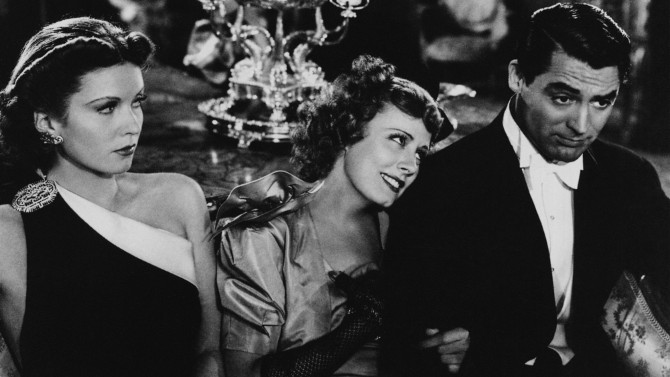In one of the most frank speeches in Oscar history, Leo McCarey, upon winning the Academy Award for Best Director, took the statuette, and boldly stated, “I want to thank the Academy for this wonderful award. . . but you gave it to me for the wrong picture”. For those who have seen Make Way For Tomorrow, you will immediately know why he said it (a picture with a message and one of the great endings in film history, Orson Welles once claimed, “it would even make a stone cry”), but, that is not to say that the movie that he won for, 1937’s The Awful Truth, is not deserving of some praise.
A motion picture that helped put the screwball comedy on the map (The Awful Truth was based on a 1922 play by Arthur Richman and filmed twice before this version), it earned six Oscar nods (claiming the trophy for McCarey) – a darling to critics and one of the top commercial successes of the decade, while its irreverent mix of slapstick (it immediately evident that McCarey directed silent comedies; for example, the works of Charlie Chase and Harold Lloyd, while also pairing Laurel and Hardy together, and into the sound era, The Marx Brothers), witty repartee, and folly filled characters make it an absolute charmer.
Jerry (Cary Grant) and Lucy Warriner (Irene Dunne) are quite the pair, a couple of beguiling flirts with lives that often deviate. . . with the audience not given the whole story, Jerry was supposed to be off in Florida (tanning at his private club to cover the ruse), and, upon his return home with some friends, finds his wife is out (gone for more than a day). The group ponders the situation until she walks in with a dandy Frenchman, Armand Duvalle (Alexander D’Arcy) – the twosome forced to “stay in the nastiest little inn you ever saw”, as the man’s car broke down. . . let us just say, the predicament is a tad troublesome.
Perhaps no better example could be found to describe the comedy sub-genre, the awkward looks and running gags, with all of its playful and not so subtle dialogue (inflections on words, priceless), an absolute treat, than, “I’m sorry the inn was so inconvenient. . . that’s the only thing that bothers me”, and, after some sloppy excuses, the idea arises that Duvalle better leave, shrugging, he says, “I really don’t know what to say”, to which Jerry replies, “If you go, you won’t have to say anything, will you?”.
And, this is where ‘the awful truth’ comes in, with the pair initiating divorce proceedings, to be finalized in ninety days. Lucy is granted custody of their dog, though Jerry has visitation rights. Living with her Aunt Patsy (Cecil Cunningham), Lucy soon meets Daniel Leeson (Ralph Bellamy), a nouveau riche multi-millionaire Oklahoma boy visiting NYC with his mother (for an extended stay). A perfect rebound for her, Jerry bounces around himself, first with a nightclub singer, finally finding himself in the arms of heiress Barbara Vance (Molly Lamont). A small city when you are part of the elite, the former couple continuously bump into each other with comedic effect.
If you know the era and the style of film, you will likely predict the ending long before its conclusion, yet that does not make the journey any less enjoyable. Utterly fetching: dance gags, a candid conversation between Lucy and her new beau (while the other men are hidden in the next room. . . it does not help that the unusually smart dog continually causes issues), and other such cheeky situations litter the feature, building to classic conclusions. An actor’s director (with just as much talent on the other side as well), his improvisational style (always a loose script – written by Viña Delmar, who also wrote Make Way For Tomorrow) lets his actors tinker on set. The master of setting up clever situations (coming to him while he played piano on set), the whole thing somehow comes together with a sort of controlled spontaneity – as odd as that may sound.
Funnily enough, Cary Grant tried everything to get out of the project due to the seemingly loose style of direction (willing to buy himself out of the film, he also attempted to give his part to Bellamy), yet it was this character that cemented that iconic Grant swagger – suave style, charm, gravitas and mesmerizing control of the camera – in every way, the major breakthrough that made him a star. This early lack of trust did not hinder their future actor/director relationship, as the pair would work together three more times (perhaps, most memorably on An Affair to Remember).
Now, something that I missed, and that film critic Gary Giddins points out on the Criterion Blu-Ray, is that the film is, in many ways, an anti-musical (a fantastic observation) – each time a song is sung, it drives the characters apart (dissimilar to nearly every other feature, where it has a unifying effect). It will be something I definitely watch for upon my next viewing, here is hoping that this will give you a heads-up as well.
With a wonderful flow and perfect pace, The Awful Truth is an excellent light-hearted comedy. At complete opposites to the melodrama Make Way For Tomorrow, McCarey demonstrates his skill – utterly impressive that they are both released the same year. Finding the perfect groove, McCarey helped develop the Cary Grant persona, something the man was never truly able to capture before but was more than adept at playing afterwards. . . the loose spontaneity that grated the actor somehow unLeaching something more than special. When combined with Oscar nominated performances by Dunne and Bellamy, you have a richly woven, perfectly acted screwball comedy. So, clock in and watch this superb picture, it is a harmonious experience.

